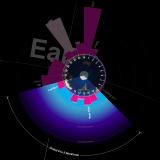World at Work
The 2008/2009 Impakt Online Exhibition shows World at Work
The project the "World at Work" rediscovers the earth as ‘Time Machine’. Its rotation around its own axis gives us our days and its course around the sun determines our earthly year. To achieve a higher degree of accuracy in organizing their life, humans divided one day in 24 hours and a year in 12 months. The acceleration of transport and information on a global scale, the introduction of time-zones became necessary at the end of the 19th century.
With "World at Work" we project the amount of inhabitants per time-zone onto the earth as ‘Time Machine’. By assuming that the average working day around the world is from 9.00am to 5.00 pm, we come to the conclusion that there is a strong imbalance in the distribution of workforce. One can almost talk about a day and night on earth.
The world as ‘Time Machine’ is visualized by its course around the sun (together with its three neighbour planets) and its spinning around its own axis. On top of its self-rotation a graph with the amount of inhabitants is projected. The third element of the visualisation is the addition of all the working population of one global working day and shows how many people are working, relaxing or sleeping.
This visualisation is shown either in real time, or can be released and speeded up at the users will. All three parts of the visualisation are interconnected as programmed clockwork that shows time by mimicking reality.
Client: Impakt Online
Design Team: Theo Deutinger, Romuald Dehio, Stefan Prins
Programming: Michael van Schaik/restruct.org
World At Work
The project the "World at Work" rediscovers the earth as ‘Time Machine’. Its rotation around its own axis gives us our days and its course around the sun determines our earthly year. To achieve a higher degree of accuracy in organizing their life, humans divided one day in 24 hours and a year in 12 months. The acceleration of transport and information on a global scale, the introduction of time-zones became necessary at the end of the 19th century. With "World at Work" we project the amount of inhabitants per time-zone onto the earth as ‘Time Machine’. By assuming that the average working day around the world is from 9.00am to 5.00 pm, we come to the conclusion that there is a strong imbalance in the distribution of workforce. One can almost talk about a day and night on earth. The world as ‘Time Machine’ is visualized by its course around the sun (together with its three neighbour planets) and its spinning around its own axis. On top of its self-rotation a graph with the amount of inhabitants is projected. The third element of the visualisation is the addition of all the working population of one global working day and shows how many people are working, relaxing or sleeping. This visualisation is shown either in real time, or can be released and speeded up at the users will. All three parts of the visualisation are interconnected as programmed clockwork that shows time by mimicking reality. Client: Impakt Online Design Team: Theo Deutinger, Romuald Dehio, Stefan Prins Programming: Michael van Schaik/restruct.org
